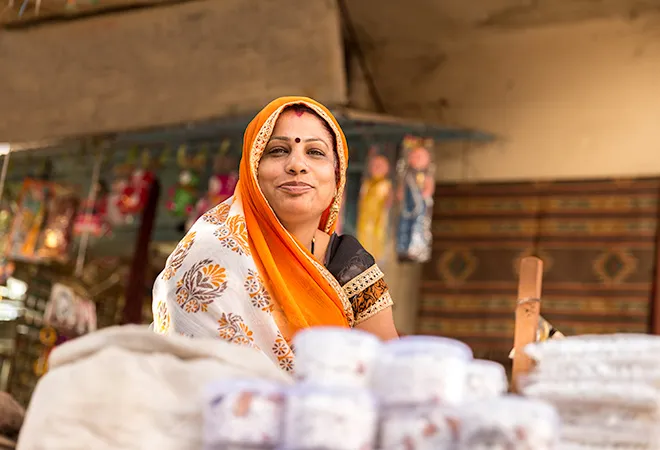 This article is part of the series — Catalysing Change: Women-led Development in the Decade of Action.
This article is part of the series — Catalysing Change: Women-led Development in the Decade of Action.
In December 2019, Pragya Mishra who lives in Satrang village in Odisha, took a loan under the
Startup Village Entrepreneurship Programme, a government scheme to support enterprises in rural areas, to start a photocopy shop. The shop was the first of its kind in her village, but in a few months, as schools and colleges were closed during the lockdown, she lost all customers. To generate income for her family, she started selling snacks, biding her time to restart the business.
Pragya Mishra belongs to the most overlooked category of entrepreneurship in India, women in microenterprises. Her struggle to start a business is documented in
a study by LEAD, a research organisation at Krea University, which analysed the impact of COVID-19 on women-owned enterprises. The study found that in the aftermath of COVID-19, the small enterprise segment was hit the hardest, and women were worse off than men, in this, as in all other sectors. One in three women entrepreneurs had shut down their business either temporarily or permanently after the lockdown, which was aggravated by the burden of increased domestic and care work.
Between 2010 and 2015, the time period for which conclusive data is available, the share of women-owned enterprises did not increase.
The data on women-owned enterprises in India —
only 20 percent of all enterprises are owned by women, a majority of which are single-person informal enterprises — tells its own story of the blind spot that persists in recognising and supporting women entrepreneurs. Take, for instance, the case of Sabitri Sahoo, who has been running a tailoring unit in Gopalpur in Odisha for the last five years. She, as most women like her, is perceived as someone who supplements her family income by stitching clothes and is not seen as an entrepreneur who had to let go of seven workers in her unit after the lockdown. The difference is subtle but significant, women who own businesses are viewed through the livelihood lens rather than the entrepreneurship lens, making them even more vulnerable to social and structural barriers.
Between 2010 and 2015, the time period for which conclusive data is available, the share of women-owned enterprises did not increase. Women-owned enterprises tend to be smaller and less productive. The proportion of women-owned enterprises that hire three or more workers is 2.7 percent. For men, the comparable number is 6.3 percent. Women are overrepresented in home-based businesses and traditional sectors like tobacco, paper, apparel, textiles, and plastic. These are some of the findings from a
2019 study on microenterprises in India by Azim Premji University and Global Alliance for Mass Entrepreneurship.
By 2030, it is estimated, up to 400 million jobs are going to be needed for women alone, and the economic and employment gap between men and women will continue to widen, if not addressed.
If women’s participation in microenterprises were to increase, it could address two crises that plague the country — job growth and
declining participation of women in the workforce. A
2019 report by the consulting firm Bain & Company projected that women entrepreneurs in India can potentially create 150-170 million jobs by 2030. By 2030, it is estimated, up to 400 million jobs are going to be needed for women alone, and the economic and employment gap between men and women will continue to widen, if not addressed.
While the microenterprise sector has largely been stagnant in India for the last two decades, women who set up enterprises are affected more than men by both social constraints and access to capital, technology and markets. The biggest barrier women face in scaling up businesses is access to adequate capital, as opposed to microloans, of which there are plenty, according to the study by Azim Premji University.
The question is how to enable women solopreneurs and small business owners to scale and contribute to economic growth.
Nearly 70 percent of total loan borrowers under the Pradhan Mantri Mudra Yojana are women according to figures shared by the government last year. The scheme has been successful in facilitating easy access to credit for women, but most of the loans are advanced in the ‘Shishu’ or micro category (up to INR 50,000). Their access to finance is made more difficult as women do not own assets like land to secure credit. The question is how to enable these women solopreneurs and small business owners to scale and contribute to economic growth.
A new project may offer some answers and learnings. The
National Rural Economic Transformation Project (NRETP), which is supported by the government and aided by the World Bank, seeks to promote women-led enterprises by enabling access to finance, building markets and networks. The NRETP is being implemented across 13 states and aims to support 80,000 rural enterprises by June 2023. It is a part of the National Rural Livelihoods Project, which was started in 2011, to create self-help groups for women at the grassroots level.
The NRETP is being implemented across 13 states and aims to support 80,000 rural enterprises by June 2023.
One thing that stands out about women-led enterprises, even the tiny ones, is the ability to persist in the face of economic disaster. The study by Krea University on the impact of the pandemic found that 73 percent of women-owned enterprises that were shut down in July had restarted by November, based on a limited sample.
Pragya Mishra could well be back to her photocopy business.
The views expressed above belong to the author(s). ORF research and analyses now available on Telegram! Click here to access our curated content — blogs, longforms and interviews.



 This article is part of the series —
This article is part of the series —  PREV
PREV


